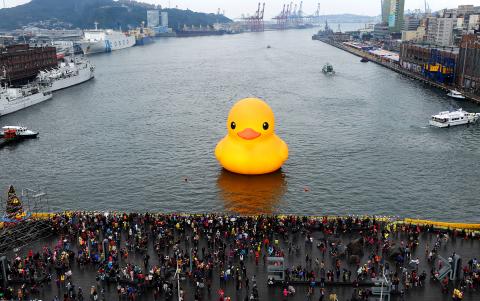About 8,000 admirers braved the cold yesterday to watch the Rubber Duck sculpture at Keelung’s harbor, despite the absence of its creator, who reportedly was upset over the poor arrangements for the show.
Dutch artist Florentijn Hofman was upset about the arrangement for his Rubber Duck installation on display in Keelung and criticized the organizers for turning it into a “commercial circus,” local media reported yesterday, citing a letter written by the artist.
A day earlier, Hofman canceled his trip to inaugurate the duck display in the northern city, expressing disappointment over how the sculpture is being portrayed in Taiwan.

Staff writer, with CNA
“The rubber duck must show a place in a different perspective as it is, pure and simple, but now we learn it is turning into a commercial circus which we don’t approve of and of course dislike,” Hofman’s team was quoted as saying in a response to the Chinese-language United Evening News’ request for his opinion on the Keelung exhibition.
The emergence of unauthorized rubber duck-themed merchandise has also upset the artist, local media reported.
Among the products allegedly infringing copyright are rubber duck-themed stored value cards used for transportation or other payments, issued by the Taiwan Smart Card Corp (台灣智慧卡公司).
The company held a press conference on Friday evening and explained that it has acquired permission from the organizers to use the duck’s image.
It promised to correct any mistakes that could have resulted in a misunderstanding.
Earlier last week, Hofman also rejected the organizers’ proposal to make a 360-degree rotation of the rubber duck, as it contravenes his idea of simplicity and tranquility.
Still, in the letter, the team said Hofman and his family liked Taiwan and enjoyed the previous legs of the duck campaign in the southern city of Kaohsiung and the northern county of Taoyuan.
Hofman’s team said they are investigating whether the organizers of the display in Keelung have violated the terms of their contract, adding that they will keep an eye on further developments regarding the duck’s display in the port city.
Meanwhile, bundled up in scarfs and jackets, fans of the 18m-tall, 1,300kg duck yesterday flooded to the pier and took photographs with the installation art.
There were even fans from Greater Taichung who took a 5am train to be on time to get a peep at the duck.
The Keelung government estimated that the rubber duck, which has created a craze on its tour to Kaohsiung and Taoyuan earlier this year, would attract more than 6 million visitors during its 50-day exhibition.

DAREDEVIL: Honnold said it had always been a dream of his to climb Taipei 101, while a Netflix producer said the skyscraper was ‘a real icon of this country’ US climber Alex Honnold yesterday took on Taiwan’s tallest building, becoming the first person to scale Taipei 101 without a rope, harness or safety net. Hundreds of spectators gathered at the base of the 101-story skyscraper to watch Honnold, 40, embark on his daredevil feat, which was also broadcast live on Netflix. Dressed in a red T-shirt and yellow custom-made climbing shoes, Honnold swiftly moved up the southeast face of the glass and steel building. At one point, he stepped onto a platform midway up to wave down at fans and onlookers who were taking photos. People watching from inside

A Vietnamese migrant worker yesterday won NT$12 million (US$379,627) on a Lunar New Year scratch card in Kaohsiung as part of Taiwan Lottery Co’s (台灣彩券) “NT$12 Million Grand Fortune” (1200萬大吉利) game. The man was the first top-prize winner of the new game launched on Jan. 6 to mark the Lunar New Year. Three Vietnamese migrant workers visited a Taiwan Lottery shop on Xinyue Street in Kaohsiung’s Gangshan District (崗山), a store representative said. The player bought multiple tickets and, after winning nothing, held the final lottery ticket in one hand and rubbed the store’s statue of the Maitreya Buddha’s belly with the other,

‘NATO-PLUS’: ‘Our strategic partners in the Indo-Pacific are facing increasing aggression by the Chinese Communist Party,’ US Representative Rob Wittman said The US House of Representatives on Monday released its version of the Consolidated Appropriations Act, which includes US$1.15 billion to support security cooperation with Taiwan. The omnibus act, covering US$1.2 trillion of spending, allocates US$1 billion for the Taiwan Security Cooperation Initiative, as well as US$150 million for the replacement of defense articles and reimbursement of defense services provided to Taiwan. The fund allocations were based on the US National Defense Authorization Act for fiscal 2026 that was passed by the US Congress last month and authorized up to US$1 billion to the US Defense Security Cooperation Agency in support of the

HIGH-TECH DEAL: Chipmakers that expand in the US would be able to import up to 2.5 times their new capacity with no extra tariffs during an approved construction period Taiwan aims to build a “democratic” high-tech supply chain with the US and form a strategic artificial intelligence (AI) partnership under the new tariffs deal it sealed with Washington last week, Taipei’s top negotiator in the talks said yesterday. US President Donald Trump has pushed Taiwan, a major producer of semiconductors which runs a large trade surplus with the US, to invest more in the US, specifically in chips that power AI. Under the terms of the long-negotiated deal, chipmakers such as Taiwan Semiconductor Manufacturing Co (TSMC, 台積電) that expand US production would incur a lower tariff on semiconductors or related manufacturing